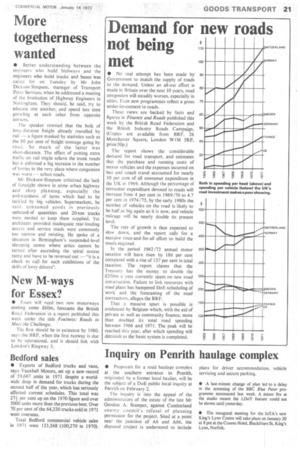Demand for new roads not being met
Page 23

If you've noticed an error in this article please click here to report it so we can fix it.
• No real attempt has been made by Government to match the supply of roads to the demand. Unless an all-out effort is made in Britain over the next 10 years, road congestion will steadily worsen, especially in cities. Even new programmes reflect a gross under-investment in roads.
These views are backed by facts and figures in Finance and Roads published this week by the British Road Federation and the British Industry Roads Campaign. (Copies are available from BRF, 26 Manchester Square, London W1M 5RF, price 50p.)
The report shows the considerable demand for road transport, and estimates that the purchase and running costs of motor vehicles and the expenses incurred on bus and coach travel accounted for nearly 10 per cent of all consumer expenditure in the UK in 1969. Although the percentage of consumer expenditure devoted to roads will increase from 4 per cent in 1969/70 to 4.7 per cent in 1974 /75, by the early 1980s the number of vehicles on the road is likely to be half as big again as it is now, and vehicle mileage will be nearly double its present level.
The rate of growth is then expected to slow down, and the report calls for a massive once-and-for-all effort to build the roads required.
In the period 1962/72 annual motor taxation will have risen by 186 per cent compared with a rise of 137 per cent in total taxation. The report claims that the Treasury has the money to double the £350m a year currently spent on new road construction. Failure to link resources with road plans has hampered DoE scheduling of work and the forecasting of the road contractors, alleges the BRF.
That a massive spurt is possible is evidenced by Belgium which, with the aid of private as well as community finance, more than doubled its total road spending between 1966 and 1971. The peak will be reached this year, after which spending will diminish as the basic system is completed,
















































































































